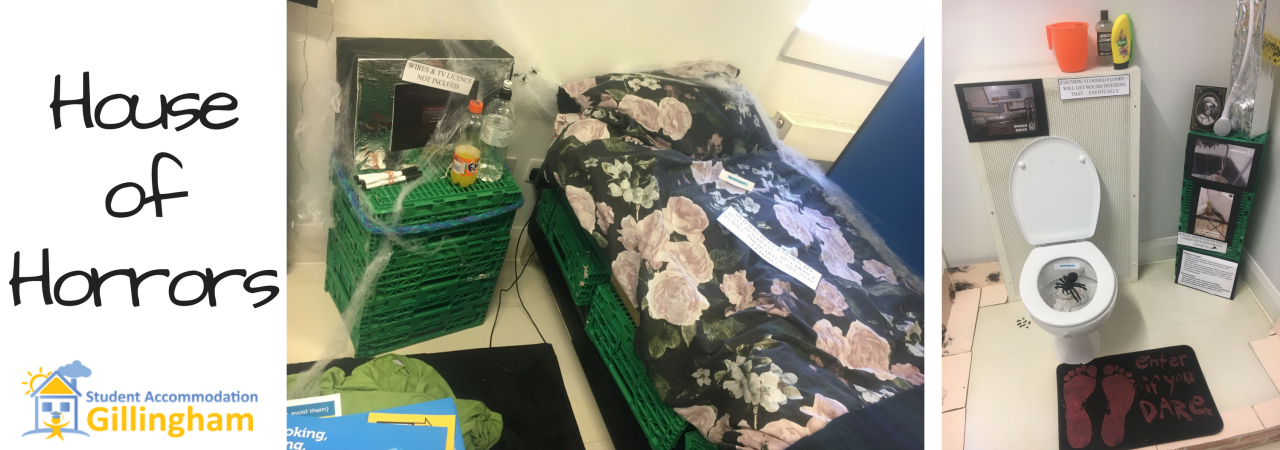House of Horrors

House of Horrors - 7 Tips for Avoiding a Dodgy Student House!!
For the last two weeks, Drill Hall Library has been host to the House of Horrors Exhibition - to help make students aware of the possible pit-falls when choosing your student digs for the next academic year.
We met with Clara Lee, the President of Welfare at the University of Kent, who put together a fantastic showcase and ran us through the common issues Students face against rogue landlords in private rented houses.
If you missed the exhibition, don’t panic! We have selected 7 useful tips to stop you running into any hidden nasty’s which could be the difference in finding your dream house instead of your House of Horrors!
1. Look for Signs of Accreditation (Landlord or Agent)
You can avoid SO many House of Horrors and rogue landlords by looking out for landlords who are accredited with a Landlord Accreditation Scheme. This means that the landlord has been given expert training which covers all aspects of private sector tenancy management and is widely regarded as the most comprehensive landlord training course on offer.
TIP: Check with your university (or local council) which landlords they have on file as being accredited and this will save you the search!
2. Talk to the Current Tenants
Speaking to the current tenants that live in the property is a great way of finding out the REAL pro’s and con’s of a house being advertised. The current tenants have lived in the house (and local area) for the past year, so it’s worth knocking on the door and asking to speak to them to get the most truthful answers to any questions you have. You can then go back to the landlord/agent and ask for any con’s to be put right before you move in. It’s crucial that any extra conditions or promises are negotiated and agreed BEFORE you sign the tenancy agreement and that they are in writing and signature by both parties.
3. Condensation, Damp & Mould
Apart from the obvious black-spot mould and wet patches of damp which are common symptoms – it’s important to note symptoms which aren’t so easy to see… such as the smell and temperature of rooms. Damp comes with a very distinct ‘muggy’ smell and often makes paint flaky or bubble. Damp also occurs in dark, cold rooms such as basements, cellars or bathrooms with 2+ external walls. Any bedroom in the basement of a house needs to be lined in a damp-course membrane to stop penetrating damp occurring. Always ask your landlord/agent if the cellar room has a damp-course and if they say it does… get it in writing as this will safeguard you should it appear during the tenancy.
Mould is a common side effect from condensation which can deteriorate your health if not dealt with, as well as ruining furniture, décor and sometimes clothes. When viewing properties make sure you pay close attention to walls, ceilings, around the windows and behind furniture.
4. Vermin & Anything Else Not Nice
Student homes are often known for the infestation of vermin and other horrible creatures, usually the cause of the previous tenants. A tell-tale sign of vermin is the state of the property on the viewing. A clean house usually means tenants clean up after themselves, take rubbish out when it’s meant to and remove any threat which could be inviting to mice. When looking around properties, be sure to be vigilant for any tell-tale signs of pests such as mess, droppings or traps.
5. Staying Safe & Warm
Make sure you look at the doors, windows and locks that are provided in the house. Ideally, you want double-glazed windows and doors at a minimum. Why? Firstly, you don’t want drafty or leaky single glazed windows (especially in winter) as these are not energy efficient and will make eat into your bill allowance. Second, single-glazed windows are easy broken into and don’t want to live in a house that is easy to break into!
It is also advisable to set up contents insurance when moving in as the majority of student accommodations do not cover the cost of personal items being lost, stolen or damaged.
6. Scrutinise the Electrical’s
Be sure to check the electrical appliances in the house are up to scratch and are all functional! Make sure that you are aware of what comes with the property when signing the contract such as whether it comes with a kettle or microwave. There’s nothing worse than thinking you’re going to have a range of kitchen appliances available but when you move in, they aren’t there or don’t work properly. On the occasion that something is faulty or broken and the landlord or agent says that it will be fixed or replaced before you move in, make sure you have that agreement written down within your contract to save yourself any unnecessary ‘he said, she said’ drama.
7. 21 Questions
Finally, ALWAYS ask questions! You should not ever be too afraid or shy to find out important information about a property; the more you know about your potential new home, the better it will be for you in the long run!
To help with more events like this one, SU kindly ask you to fill out their latest Student Accommodation survey for Kent Uni and Greenwich Students. You also get the chance of winning at £50 voucher of your choice so get filling in and spread the word people!
CLICK HERE - https://unionkent.wufoo.com/forms/medway-student-housing-survey/
Lastly, a HUGE thank you for Clara Lee and her team for putting together such an informative exhibition and we look forward to seeing you all again soon at the Housing Fair on 24th January 2016.
In : Tenant Tip
